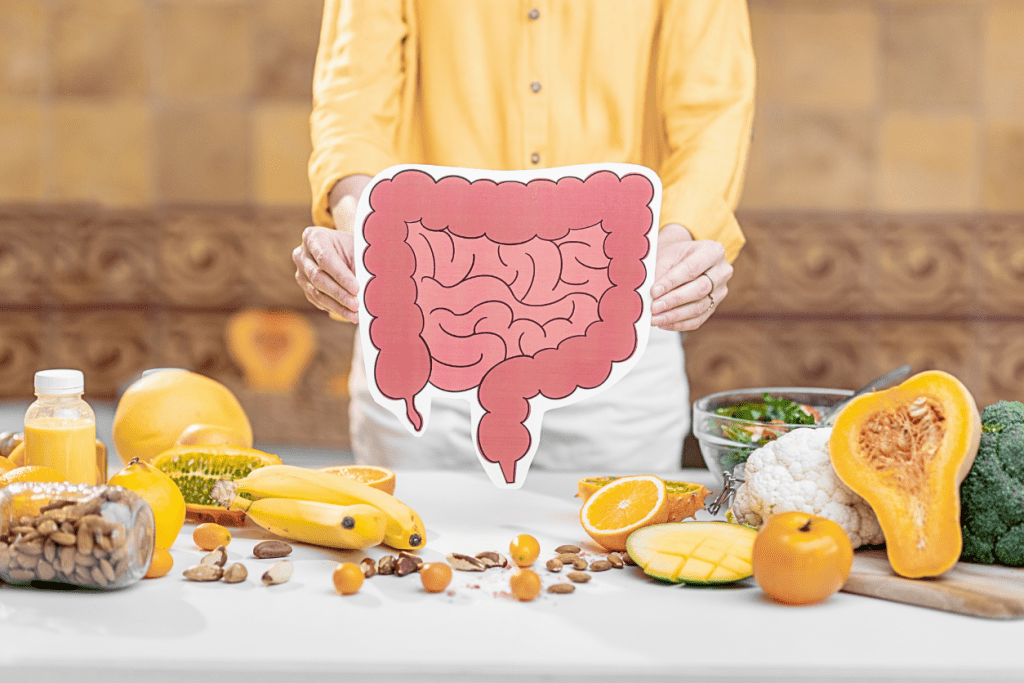The brain-gut connection: How gut health can impact recovery from a brain injury

Did you know that the health of your stomach/gut can play a role in brain recovery? Research has shown that the gut and brain are connected, this relationship is called the gut-brain axis. For individuals recovering from brain injuries, maintaining good gut health can support brain healing and emotional wellbeing.
-
The brain-gut axis: What is it?
The brain and gut are connected by a network of neurons, hormones, and immune pathways. This connection is known as the brain-gut axis and allows for communication between the gut and the brain. Recent studies suggest that gut health can influence inflammation, mood, and brain function. These are all factors that are important during recovery from a brain injury.
-
Why gut health matters
After a brain injury, inflammation in the brain can impact brain function and a person’s emotional balance. The gut plays an important role in managing this inflammation. Gut Microbiome is the community of bacteria in the digestive tract. Research shows that an imbalanced gut Microbiome may worsen neuroinflammation, potentially prolonging recovery. However, a healthy gut can help reduce inflammation and improve mood regulation which can help the healing process.
-
Nutritional tips for supporting gut health
To maintain a healthy gut, it’s important to focus on your diet. Certain foods can nourish the gut Microbiome and support overall brain health. Ways to help nourish your gut include;
- Eat a variety of fruits and vegetables: The more variety you have in your diet means that you have more diversity in your gut Microbiome. Studies have shown people with a higher variety in their gut Microbiome have better health than those with a lower variety.
- Eat prebiotic-rich foods: Prebiotics are found in foods like garlic, onions, and bananas. Prebiotics feed beneficial gut bacteria.
- Incorporate probiotics: Yogurt, kefir, and fermented vegetables like sauerkraut introduce healthy bacteria to the gut and this improves the microbial balance.
- Eat anti-inflammatory foods: Omega-3 fatty acids found in fish, flaxseeds, and walnuts can reduce inflammation and support both gut and brain health.
- Stay hydrated: Drinking enough water is important for digestion and brain function.
-
The role of the Microbiome in mental health
Brain injury recovery is not just physical, it’s also emotional. Gut health can have an impact on mental health through the production of neurotransmitters like serotonin. Serotonin is responsible for regulating mood. Researchers suggest that nearly 95% of serotonin is produced in the gut. Improving gut health is also thought to lower anxiety and depression, which are both common after brain injuries.
-
Practical steps to improve gut health
Some practical steps to improve gut health include:
- Mindful eating: Take your time to eat slowly and chew thoroughly to aid digestion.
- Avoid processed foods: Try to limit eating a diet of highly processed food. These types of foods can disrupt the gut Microbiome and cause inflammation.
- Consider supplements: Discuss with your doctor the option of taking probiotic and prebiotic supplements. These supplements can help support gut health, especially if diet changes are hard after a brain injury.
- Exercise: Exercise has been shown to increase the diversity of your gut bacteria, reduce inflammation, and improve overall digestive function.
While research on the brain-gut connection looks promising, there is still so much to learn. Talk to your doctor or dietician about improving your gut health. Including gut-friendly foods in your diet and practising mindful eating habits can be a great step in the journey to healing.
Sources:
Mind-altering microorganisms: the impact of the gut microbiota on brain and behaviour: https://www.nature.com/articles/nrn3346
What the Gut Microbiome Can Tell Us About Concussions: https://www.houstonmethodist.org/leading-medicine-blog/articles/2022/jan/what-the-gut-Microbiome-can-tell-us-about-concussions/
The link between our food, gut Microbiome and depression: https://www.washingtonpost.com/wellness/2023/01/31/gut-Microbiome-anxiety-depression/
The best foods to feed your gut Microbiome: https://www.washingtonpost.com/wellness/2022/09/20/gut-health-Microbiome-best-foods/
Diet-Microbiome-gut-brain nexus in acute and chronic brain injury: https://www.frontiersin.org/journals/neuroscience/articles/10.3389/fnins.2022.1002266/full
A Review of Traumatic Brain Injury and the Gut Microbiome: Insights into Novel Mechanisms of Secondary Brain Injury and Promising Targets for Neuroprotection: https://www.mdpi.com/2076-3425/8/6/113
Gut/brain axis and the microbiota: https://www.jci.org/articles/view/76304
Gut microbiota’s effect on mental health: The gut-brain axis: https://pmc.ncbi.nlm.nih.gov/articles/PMC5641835/#sec1-4
Gut Microbiota and their neuroinflammatory implications in Alzheimer’s Disease: https://pmc.ncbi.nlm.nih.gov/articles/PMC6266223/